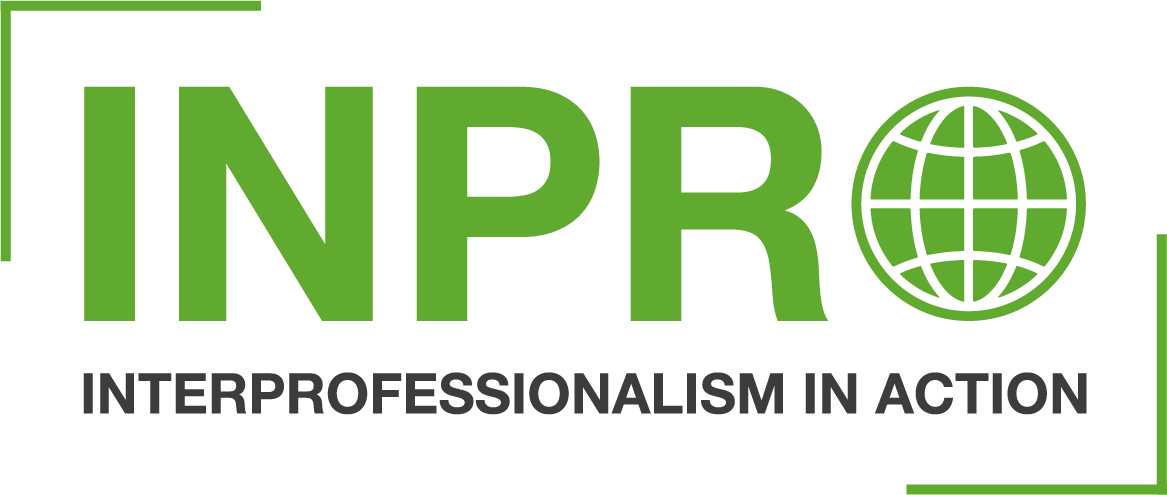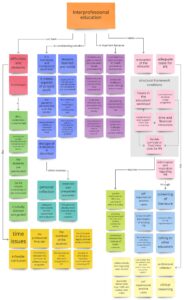Mainpage IP-Education
Subpage 1 Rehabilitation practice
Subpage 2 Academic classroom
Subpage 3 Scientific background IP-Education
Academic classroom
This is, how interprofessional education could feel like…
…for the lecturer in higher education
This concept map provides information about benefits and challenges of IPE interventions and how you can produce better outcomes and reduce problems.
...for students learning person-centred IPECP (5 min video)
...for the person (patient) participating in IPECP
 Explore the inspiring didactics
Explore the inspiring didactics
that we learned about, applied or developed. Some show the general idea, some detailed examples.
They range from short or independent to virtual and international.
Design Thinking Workshop
In consecutive workshops, participants worked out competencies that students, teachers, and practitioners need to have, and how this is or could be reflected in the training of health professionals.
INPRO International Online Learning
In this intervention, students will meet in small groups interprofessionally / monoprofessionally and discuss a case by using ICF interprofessionally. They meet a client/actor for an interview to decide goal options. Later, they reflect, discuss, and present the findings.
Practice in rehabilitation
This 2-day workshop is focused on individual therapy planning, perceiving patients holistically, interprofessional collaboration, connected thinking and reflecting critically on the structure of a team meeting.
Practice in prevention, with children
In cooperation with a School, students (physiotherapy, dietetics) form interprofessional teams and work with pupils (10-12 years old) on their health concerns.
JAMK case days
In this intervention, students will work together in interprofessional teams to discuss a patient-case. A patient/actor will be interviewed by the group and based on their information they have to plan and carry out a rehabilitation plan.
IPROL
In small interprofessional groups the students work together and discuss patient cases. On the third day group presentations on given topics in front of invited colleagues from different professions take place. The students reflect focus questions by means of a portfolio. These are about group communication, personal development, and professional development, as well as interprofessional experiences.
Renewed Interprofessional Skills Day
The student works within a team of 5 that comprises at least 3 different professions. The team is guided by a variety of tasks that are delivered per timeframe and students move towards profession specific classrooms (nursing ward, exercise classroom, dietetic kitchen, etc. ). On day 1, they treat video cases, on day 2 they assess real-life patients.
Interprofessional Casework
Within several group discussions, students from different professions are guided by lecturers representing each profession to discuss, solve and present a case study on therapy and rehabilitation from an interprofessional perspective.
Activity Based Group Work Course
In this course students learn how to plan and implement a goal directed group intervention that supports client´s participation of social and health care sector.
IPCIHC - Interprofessional Collaboration in Health Care
The interprofessional learning intervention consists of 17 training programs from 5 different institutions organizing an Interprofessional Collaboration in Healthcare 1. A unique joint training, which receives yearly an upgrade to address feedback and contextual changes. IPCIHC 1 is a learning module which has several levels of interprofessional collaboration (bachelor students, master student and current developments towards professionals). Panels with in total about fifty experts, patients and stakeholders from welfare and health care interact with the participating students on the final day.
ZORO-Training: Module Interprofessioneel Samenwerken
The ZORO-training consist of 4 modules, of which the module interprofessional collaboration is the first one. The aim is to strengthen the competence of the participants through the training and validate the ZORO-training.
Future Factory Project Course
In this intervention students learn understand the significance of multidisciplinary and customer-oriented project work in working life-oriented development, innovation and problem solving. They are capable of responsible working and interaction, making use of and sharing their own expertise.
iLab - Interdisciplinary Lab
iLab studies are based on reflective and community project-based learning in international and interdisciplinary teams in English. All learning happens in the team context and learning goals are based on 21st Century Skills
Teaching and Learning Process Reflection
Within this course it is aimed for students to appraise their own skills concerning professional, organizational, coordinating, and administrative requirements in their professional field.
Functioning, Participation and Counselling
In this course students learn about the factors affecting functioning and inclusion and how to influence them. They have the ability to motivational and interactive guidance in client situations.
Health professionals interprofessional
For this business game, the students switch their chosen degree program to a randomly appointed one. Students of nearly all bachelor courses come together to learn about health and disease, process, and quality management, learning with new media as well as gender and diversity. The teachers also have different professional backgrounds and offer a vast range of knowledge and experience.
Interdisciplinary Communication
Interdisciplinary and interprofessional communication are very important factors for successful patient treatment and health collaboration. For this intervention students visit different health institutions where interprofessional collaboration is well situated. Based on complex case studies the benefits and challenges from interdisciplinary communication will be discussed.
Professional Conversation and Interaction
Based on an interprofessional communication course which involves physiotherapy, nursing and health management and health promotion students this interprofessional intervention "Professional Conversation and Interaction" focuses more on patient-centered communication of health professionals and on team communication among each other.
Online Nutrition Workshops for Social Workers
Dietetic students created workshops in mono-professional small groups. The workshop was aimed at and presented to social workers. After the presentation, questions were collaboratively answered in multi-professional groups.
Practice of Nutrition Therapy and Dietetics
Promote interprofessional exchange among faculty and students at the university level, get to know each other's professional profiles, promote interprofessional collaboration among students at the university level and create basis for interprofessional collaboration in professional life.
The Austrian Health System
What is the role of the respective professional group in the respective field of work? What are the different perspectives of the individual professions? How can interdisciplinary cooperation contribute to meeting individual challenges in health care? By working on case studies, it is possible to convey the different perspectives on a health problem to the students, whereby an active exchange between the study courses is encouraged.
Intensive Program (IP) "Quality of Food Intake and Social Exclusion"
The content of this interdisciplinary IP was the exchange between the disciplines of "dietetics" and "social work" with regard to improving the accessibility of vulnerable groups, the sustainable promotion of their health and nutritional quality and the development of application-related results in cooperation with social organizations.
English for Health Professionals
The courses "English for Health Professionals 1" and "English for Health Professionals 2" are language courses with a focus on healthcare that take place in the first and second semester of several Bachelor courses, including Nursing, Physiotherapy and Health Management & Health Promotion
Interprofessional collaboration in health care
In a course unit students learn about interprofessional collaboration and its role enhancing quality in health and social care.
PROMISE
This is a 3-day class with students from the dietetics, physiotherapy, nursing, and social science study program. In the small interprofessional groups the students work together with patient cases.
Interprofessional Skills Day
Students meet a real complex patient on which they can ask question during history taking and who is their starting point for the ISD.
Interprofessional Innovation and Entrepreneurship
For the second-year project interprofessional innovation and entrepreneurship, the students of the six different courses are mixed into groups which will work with care related contribution to the Sustainable Development Goals.
Interprofessional Collaboration Project
In this module students of different studies work on a specific issue/problem as a project team. Project groups will create a design for a solution to the previously stated issue/problem. If possible, IP-project groups will further develop this solution into a prototype.
Disclaimer
The European Commission's support for the production of this publication does not constitute an endorsement of the contents, which reflect the views only of the authors, and the Commission cannot be held responsible for any use which may be made of the information contained therein.


